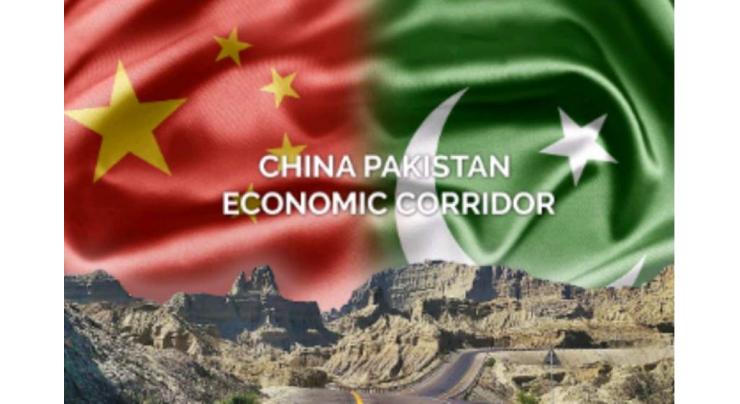By Dr Saeed Ahmad Ali
The great initiative, China-Pakistan Economic Corridor (CPEC) , is swiftly exploiting immense potential in industrial cooperation between the two neighbouring countries, and the largest trading partner of Pakistan, China is making huge investment in the energy and infrastructure sectors here.
In terms of geo-economic growth, development and regional connectivity, CPEC has emerged as the largest bilateral investment project, and a boon for Pakistan as well as the landlocked regional countries in south Asia.
Pakistan and China are tied in multidimensional cordial relations on the basis of being good neighbours, and having mutual trust and understanding.
According to a document of the Ministry of Communication, the Pak-China bilateral trade reached US$ 18 billion during 2018. With the official launch of CPEC, the bilateral relationship has been elevated to a higher level, aiming at enhancing connectivity and building up road and energy infrastructure between the two countries.
As we know, CPEC is a flagship project of Chinese President Xi Jinping’s initiative of “One Belt, One Road” (OBOR).
The Year 2021 is being celebrated as a historic year as it marks the completion of 70 years of diplomatic relations between Pakistan and the People’s Republic of China. Pak-China diplomatic relations were established on 21 May 1951, according to the Institute of Policy Studies (IPS).
To commemorate this historic milestone in a befitting manner, both brotherly countries will organise a series of events throughout the year.
In this connection, friendly exchanges are taking place between Pakistan and China, and several high-profile cultural events, seminars are being organised to highlight people-to-people interactions.
Though both countries have been making policy adjustments from time to time in the light of global transformations, yet their mutual ties have continued to be in the best coordination and harmony. The world has witnessed that Pakistan and China are time-tested friends and they depend on one another to fulfill their strategic interests.
In the past, whenever Pakistan confronted any external, internal pressure or threat to its interests or security, China immediately extended full support to Pakistan in all fields.
At the international diplomatic fora, China has significantly supported Pakistan, like at Nuclear Suppliers Group, (NSG), the G-20, and during the United Nations Security Council (UNSC) sessions.
The first phase of CPEC has successfully accomplished its tasks on the road infrastructure and energy development projects in Pakistan. In the second phase, the initiative envisioned industrial cooperation, which has started bearing fruits, and is proving beneficial for development of economy of Pakistan.
CPEC and its related projects have brought forth many opportunities and resources for both the countries by promoting their profits and interests respectively.
However, the mega project is being viewed negatively by our neighbouring country India and the US, who are making attempts to portray it negatively and sabotage it.
A document of Pak-China Free Trade Agreement (CPFTA -Phase-II ) says that it will help deepen trade ties between Pakistan and China by expediting liberalization of trade and protecting and safeguarding mechanisms for domestic industry of Pakistan and trade products.
Dr Liaqat Ali Shah, CPEC Project Director, told APP that Pakistan Tehreek-e-Insaf (PTI) government was securing great results from CPEC, adding that despite global economic challenges amid COVID-19 pandemic, a large number of unemployed youth were being provided internship opportunities in Pakistan, while the skilled professionals were already doing jobs under this mega project.
Replying to a question, Shah said that work on the second phase of China-Pakistan Economic Corridor was under way at a fast pace, adding that defeating the debunkers, who had been trying to malign the incumbent authority on account of slow-down work on CPEC projects, was a great achievement.
Giving detail of the current projects in the Phase-II, he said that the groundbreaking of two mega hydel power projects worth $11 billion had been held, speedy construction and development of the Gwadar port city was under way besides construction of Special Economic Zones (SEZs) and ML-1 railway project.
He said talks were also being held with the Chinese side on financial matters of $7.2 billion, expanding the scope of CPEC by including science & agro-technology and tourism sector initiatives in it. He said that all these projects clearly showed that work on the game-changer initiatyive was going on in full swing.
To facilitate the local and foreign investors, the incumbent government, as per the CPEC Authority Bill-2020, is working round-the-clock to ensure smooth execution of industrial projects, he added.
Federation of Pakistan Chambers of Commerce and Industry (FPCCI) President Mian Nasser Hyatt Magoo told APP that Pakistan and China were enjoying close and friendly relations since the establishment of their diplomatic relations, adding that over the years, the relationship had blossomed into an all-weather strategic cooperative partnership, with CPEC at its core.
Pakistan considers China as one of its closest friends and partners and China considers Pakistan as its ‘Iron Brother’, he added.
Appreciating the PTI government, he said that setting up mega industrial projects under the 2nd phase of CPEC would change the fate of the country.
After becoming fully operational, the Gwadar port under CPEC would become a harbinger of massive export-import activity, and a new industrial gateway to both the Central Asian and Persian Gulf countries would open, he hoped.
Magoo, while replying to another query, said that the energy and goods transportation would engage the economic partnership of around 64 countries of Europe, Asia and the middle East.
CPEC was a tower of economic success and a hope of the people of the whole region, having the scope of an advanced future to strengthen a digital economy, based on peace and prosperity, he said.





















